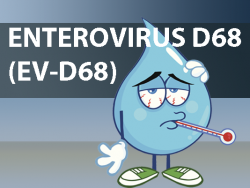
Georgia Department of Health
Hundreds of children from coast to coast in the U.S. are sick with a respiratory illness caused by an uncommon strain of enterovirus virus. Not surprisingly, Georgia also has lab confirmed cases of Enterovirus D68 (EV-D68) infection.
Enteroviruses are very common viruses; there are more than 100 different types. It is estimated they are responsible for 10 to 15 million infections in the U.S. each year, mostly among children. They commonly circulate in summer and fall.
“EV-D68 was first identified in California in 1962,” said Cherie Drenzek, DVM, state epidemiologist at the Georgia Department of Public Health. “Compared with other enteroviruses, it has been rarely reported in the United States.”
EV-D68 can cause mild to severe respiratory illness. Mild symptoms may include fever, runny nose, sneezing, cough, and body and muscle aches. Symptoms can be more severe and include wheezing and difficulty breathing, especially in children with asthma. Infants, children, and teenagers are most likely to get infected with enteroviruses because they do not yet have immunity from previous exposures to the viruses.
Keep Your Child from Getting and Spreading Enterovirus D68 (PDF)
EV-D68 can only be diagnosed by doing specific lab tests on specimens from a person’s nose and throat. Right now, all EV-D68 testing is being done by the CDC. The CDC recommends that healthcare professionals only consider EV-D68 testing for patients with severe respiratory illness and when the cause is unclear.
There is no vaccine or specific treatment for EV-D68, but there are ways to protect yourself from getting sick.
“It is the same thing mothers have told their kids for decades,” said Drenzek. “Wash your hands!”
Good hand and respiratory hygiene are the keys to staying healthy and preventing EV-D68 and other infectious disease like the flu.
- Wash hands often with soap and water for 20 seconds, especially after changing diapers.
- Avoid touching eyes, nose and mouth with unwashed hands.
- Avoid kissing, hugging, and sharing cups or eating utensils with people who are sick.
- Disinfect frequently touched surfaces, such as toys and doorknobs, especially if someone is sick.
For more information about EV-D68 go to http://www.cdc.gov/non-polio-enterovirus/about/EV-D68.html.


Be the first to comment